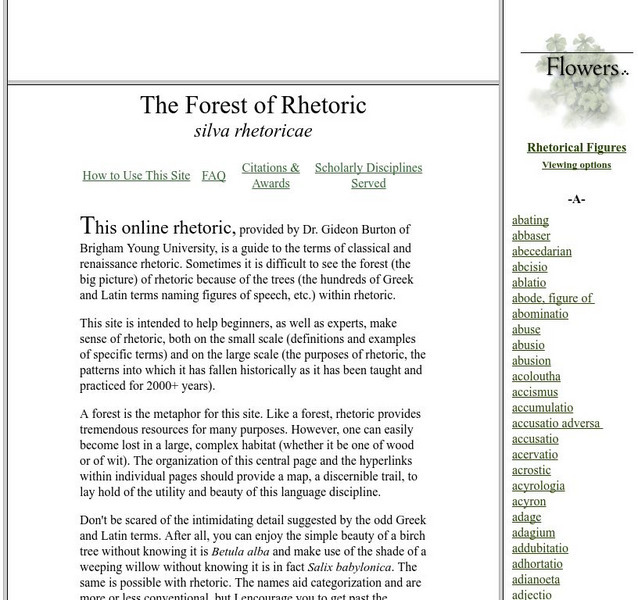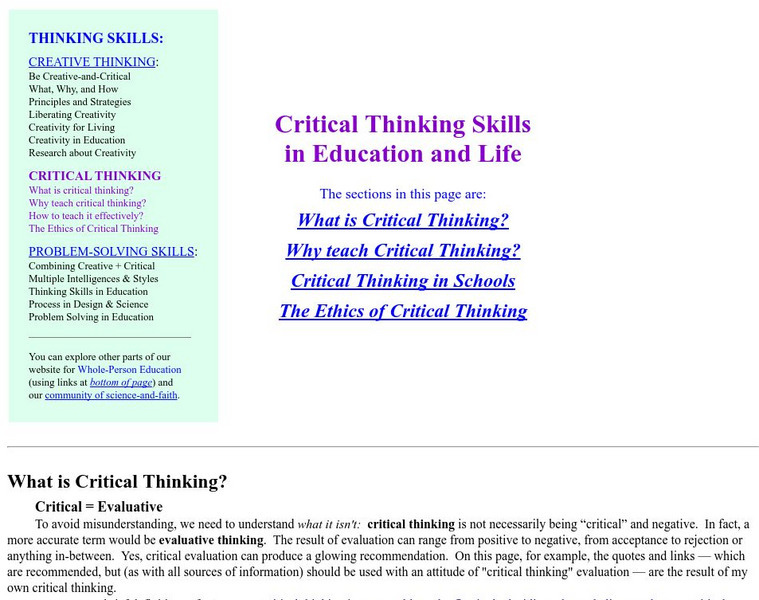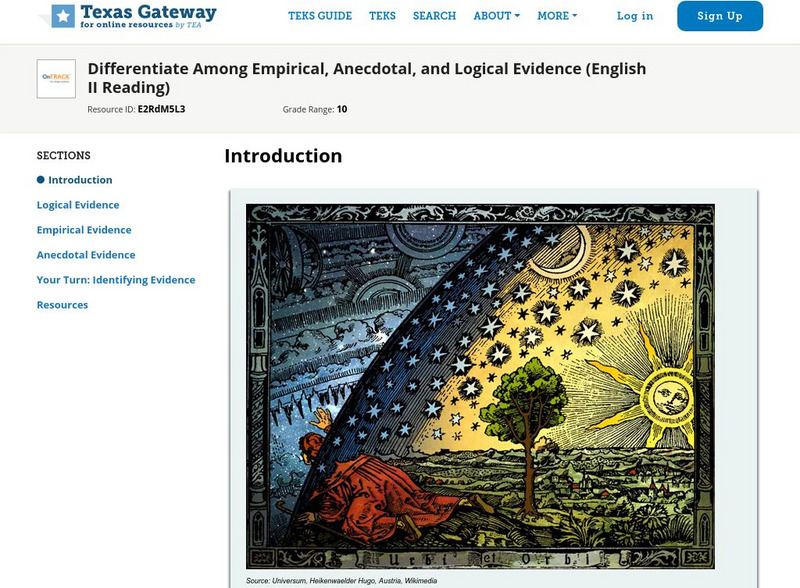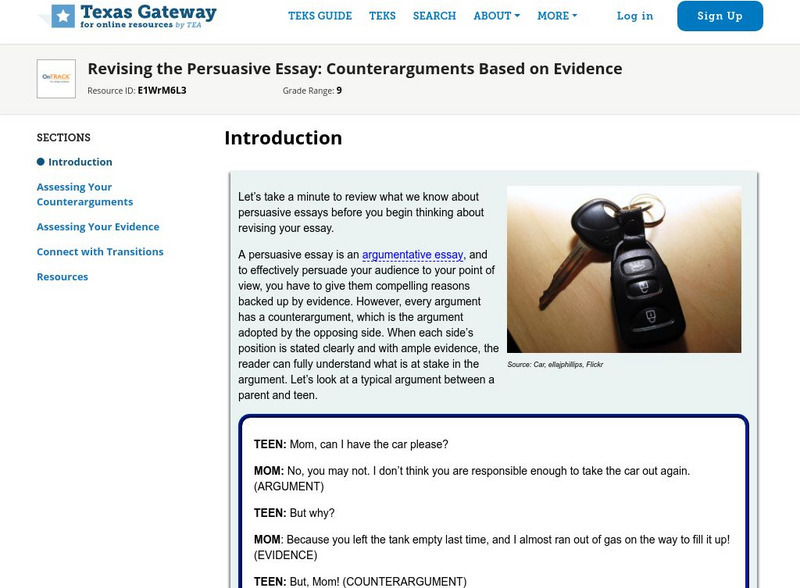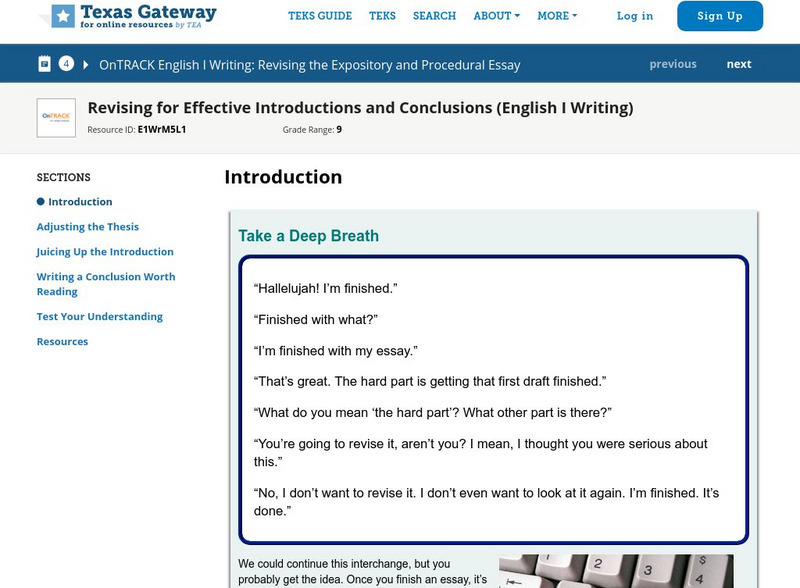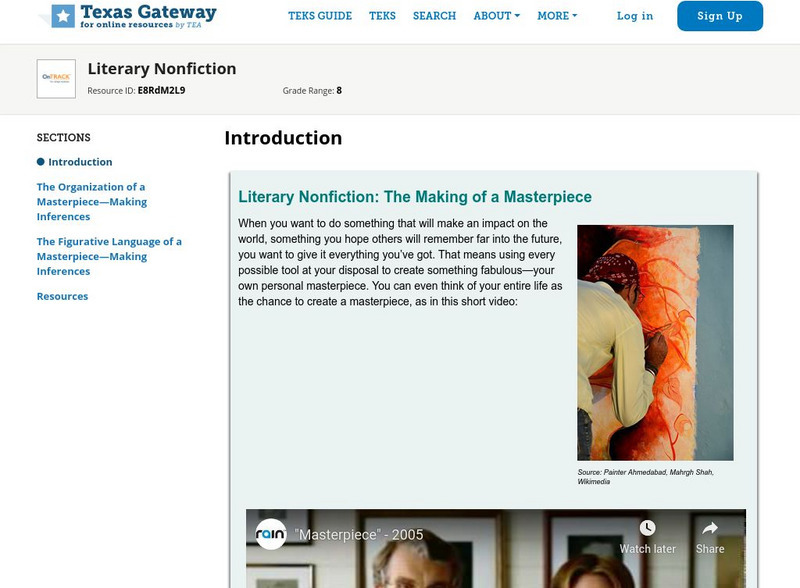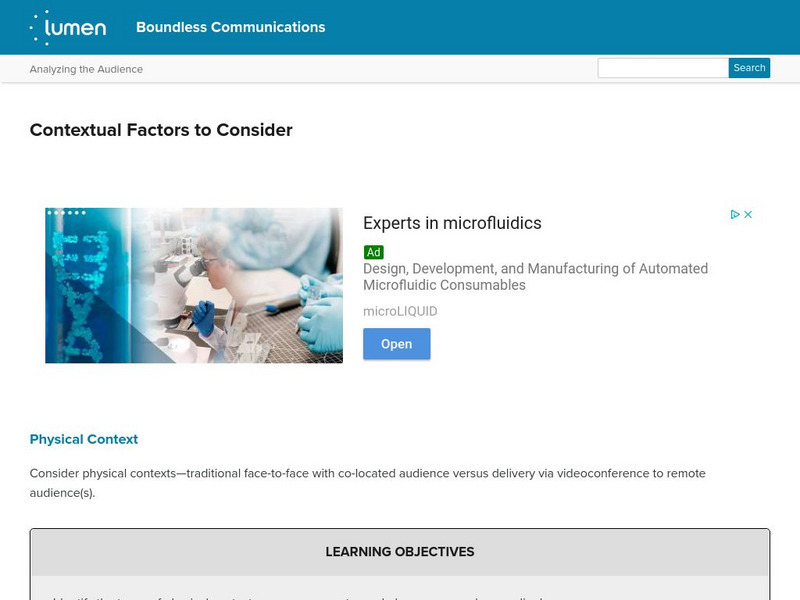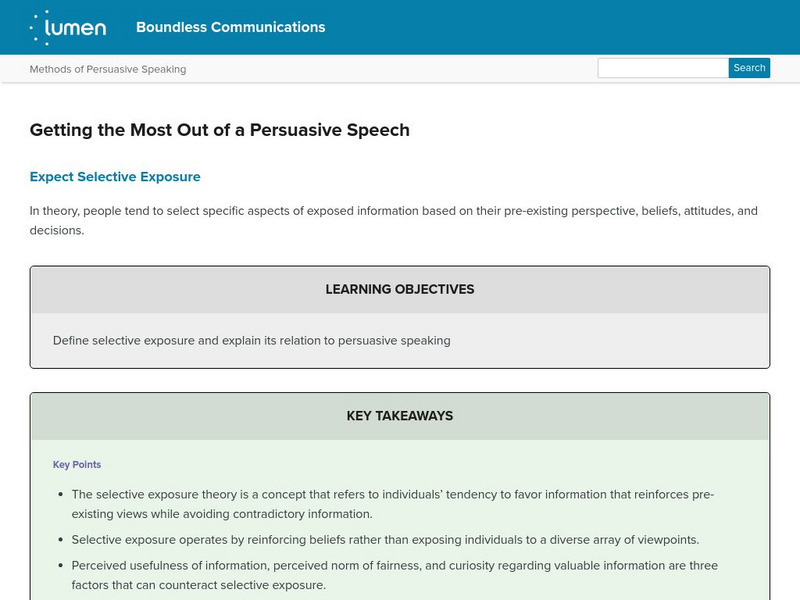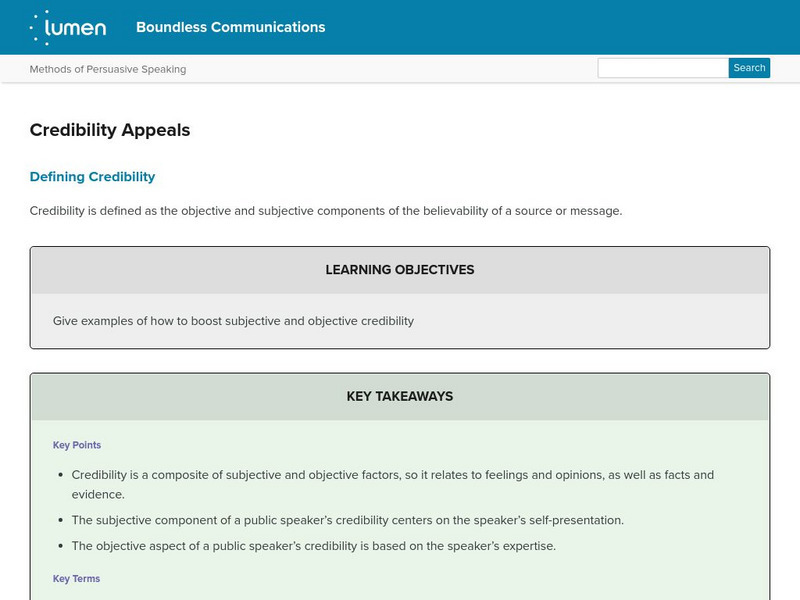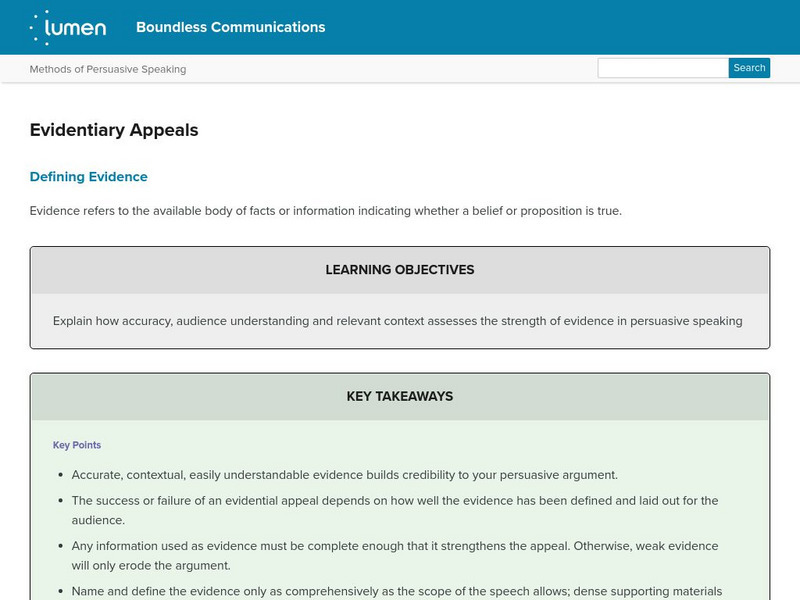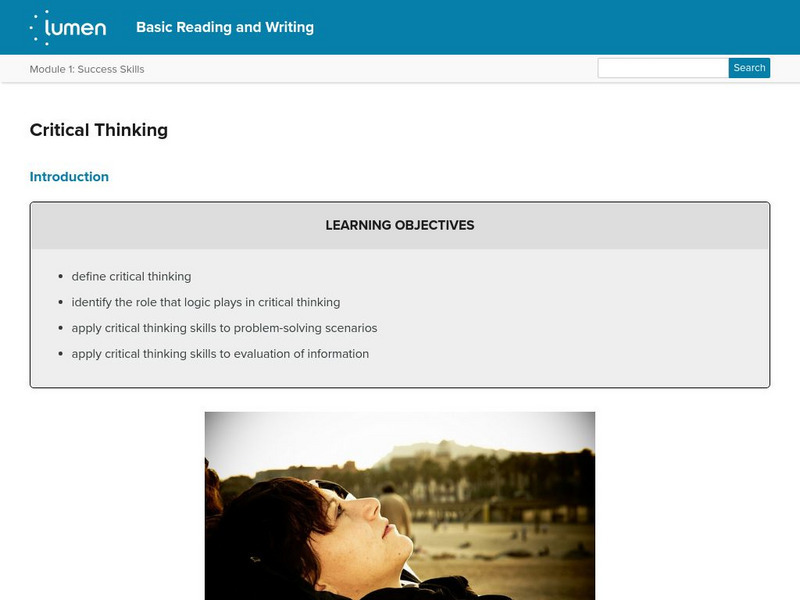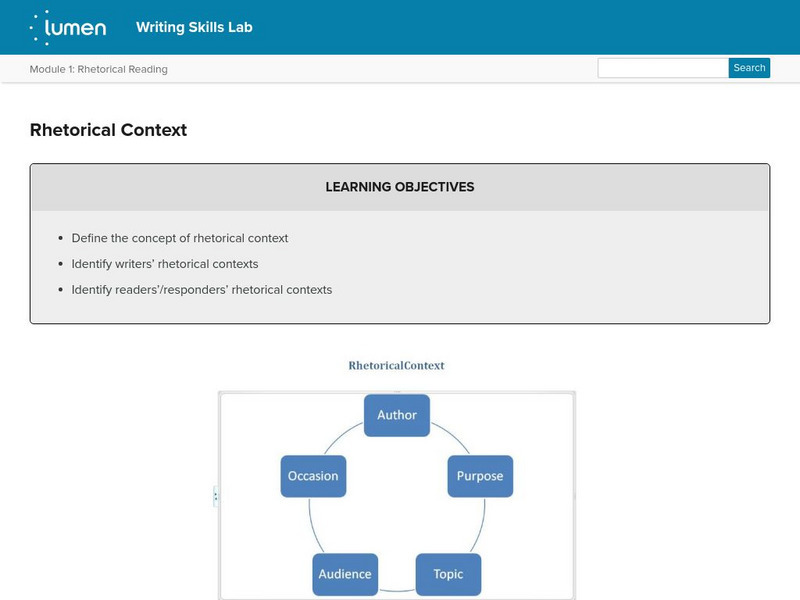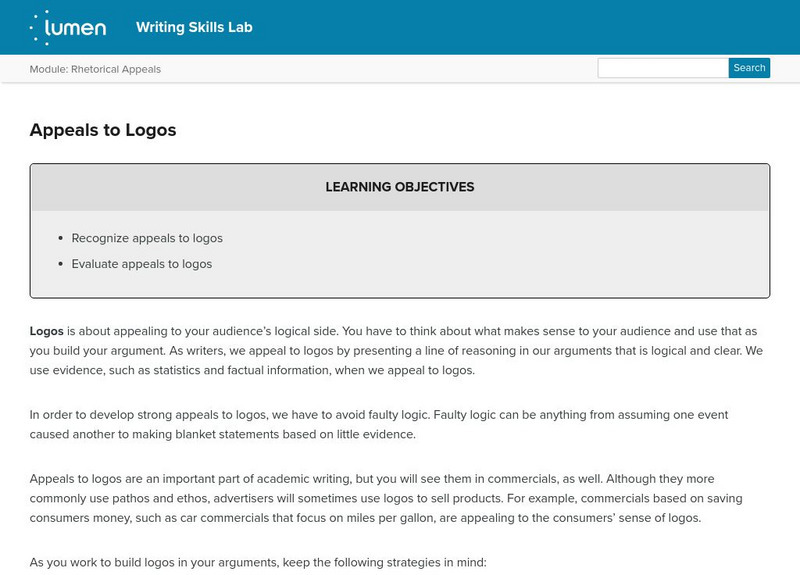Brigham Young University
Brigham Young University: Forest of Rhetoric
This site is provided for by the Brigham Young University. Almost anything you would want to know about rhetoric and speech is here with great examples and explanations. Intended for a college-level audience, but plenty for younger...
Grammarly
Grammarly Handbook: Logic in Argumentative Writing
An explanation and examples of several different types of logic that can be used in argumentative writing.
Other
Asa Education: Critical Thinking Skills in Education and Life
There are many links and resources on this site dealing with critical thinking. It includes everything from the characteristics of critical thinkers to the logic of critical thinking.
Texas Education Agency
Texas Gateway: Analyze Shifts in Perspective in Informational/persuasive Text
[Accessible by TX Educators. Free Registration/Login Required] Explain shifts in perspectives in the same argument and make decisions about support used in those arguments.
Texas Education Agency
Texas Gateway: Differentiate Among Empirical, Anecdotal, and Logical Evidence
[Accessible by TX Educators. Free Registration/Login Required] Distinguish among different kinds of evidence in a text that supports conclusions and arguments in texts.
Texas Education Agency
Texas Gateway: Analyze an Argument: Practice 1 (English Ii Reading)
Analyze the quality, relevance, and credibility of evidence that supports or opposes an argument.
Texas Education Agency
Texas Gateway: Relevant Information and Valid Inferences (English I Writing)
[Accessible by TX Educators. Free Registration/Login Required] Learn strategies for evaluating and revising an essay so that it contains relevant information and valid inferences.
Texas Education Agency
Texas Gateway: Analyze an Argument: Practice 1 (English I Reading)
Analyze the quality, relevance, and credibility of evidence that supports or opposes an argument.
Texas Education Agency
Texas Gateway: Analyze the Relevance, Quality, and Credibility of Evidence
[Accessible by TX Educators. Free Registration/Login Required] Analyze the quality, relevance, and credibility of evidence that supports or opposes an argument.
Texas Education Agency
Texas Gateway: Revising the Persuasive Essay: Counterarguments Based on Evidence
[Accessible by TX Educators. Free Registration/Login Required] Learn strategies for evaluating and revising counterarguments that anticipate objections in an essay.
Texas Education Agency
Texas Gateway: Revising for Effective Introductions and Conclusions
[Accessible by TX Educators. Free Registration/Login Required] Learn strategies for evaluating and revising an introduction, conclusion, and controlling idea or thesis in an essay.
Texas Education Agency
Texas Gateway: Writing Counterarguments Based on Evidence (English I Writing)
[Accessible by TX Educators. Free Registration/Login Required] Write an essay including counter-arguments that anticipate objections.
Texas Education Agency
Texas Gateway: Literary Nonfiction
Learn how to analyze literary nonfiction, particularly speeches, by making inferences and drawing conclusions based on evidence in the text.
Lumen Learning
Lumen: Boundless Communications: Contextual Factors to Consider
This lesson focuses on contextual factors to consider when analyzing your audience including physical contexts, values, beliefs, attitudes, and needs, audience opinion of you and your topic, and audience knowledge of your topic.
Lumen Learning
Lumen: Boundless Communications: Getting the Most Out of a Persuasive Speech
This lesson plan focuses on presenting a good persuasive speech. It discusses the selective exposure theory, kinds of appeals, and expectations.
Lumen Learning
Lumen: Boundless Communications: Credibility Appeals
This activity focuses on using credible appeals in persuasive speeches including defining subjective and objective credibility, the types and elements of credibility, and the ethical use of credibility appeals. CCSS.ELA-Literacy.CCRA.W.8
Lumen Learning
Lumen: Boundless Communications: Evidentiary Appeals
This instructional activity focuses on the use of evidentiary appeals in persuasive speeches including definition, evaluating your evidence, and strategies for using evidence effectively. Click on next at the bottom right to continue.
Lumen Learning
Lumen: Boundless Communications: Logical Appeals
This lesson focuses on using logical appeals in persuasive speeches including inductive and deductive reasoning, inductive reasoning and associative reasoning, forming a rational appeal, and errors in reasoning-formal and informal.
Lumen Learning
Lumen: Success Skills: Critical Thinking
This lesson focuses on critical thinking including a definition, examples, a video of critical thinking in action, logic in critical thinking, questions a critical thinker asks, guidelines for critical thinking, problem-solving, and...
Other
Bbc: H2g2 Circular Reasoning
Excellent definition and discussion of the term "Circular Reasoning," including a couple of very clear examples.
Lumen Learning
Lumen: Rhetorical Reading: Rhetorical Context
This lesson focuses on rhetorical context including defining it, questions to ask to understand it, and how it can be useful to the reader and responder.
Lumen Learning
Lumen: Rhetorical Reading: Putting It Together: Rhetorical Reading
This is a summary of the previous lessons having to do with rhetorical reading including rhetorical context, previewing text, actively reading, using context clues, and reading voraciously.
Lumen Learning
Lumen: Rhetorical Appeals: Appeals to Logos
This lesson focuses on appeals to logos, or appealing to your audience's logical side including your types of source material, remembering your audience, and being sure to maintain clear lines of reasoning throughout.
Lumen Learning
Lumen: Rhetorical Appeals: The Star Criteria
This lesson focuses on the STAR Criteria for evaluating appeals to logos; it includes evaluating for Sufficiency, Typicality, Accuracy, and Relevance.
